by admin | Mar 22, 2011 | Blog, Promotion
The “pitch” – Large integrated advertising agencies (those that do everything under one roof) as well as small specialist types that focus on one or a combination of; strategy, creative, sales promotions, or media, compete for the client – usually a company that has a decent marketing budget – for arguments sake $3m+.
The competition is a call from the client to what is essentially a beauty pageant, where the contesting agencies spend hours and thousands of dollars preparing and rehearsing what they are going to say on pitch day.
You can do the same without taxing yourself or the candidates much more than what is already a stressful process of job hunting. In fact the outcome is much fairer for the applicant and more indicative of who can actually do the job!
As much as I cringe at the Donald Trump’s “Apprentice”, in every country, one thing is certain, the job interview process is extensive and based on doing and achieving, not answering template questions from the “Good Interview Guide” circa 1967.
Personally, I don’t give a flying fox about your biggest challenge; I care about how you will overcome my business challenges! And for those reading this and thinking of asking questions most consultants wish they could get a dollar for every time they hear them “have you worked on insert business of choice here, before, please refer to “Point 5: Outsourcing” of this series and remember 2 things:
- A marketer who has worked on your “type” of business will at best bring about some efficiency
- A marketer who has not worked on your type of business is more likely to examine the problem with a more “curious mind” and with some luck will break the cycle of “we’ve always done it that way” – some call it innovation.
Finally, yes this is a shameless promotion for those of us rare creatures with a decade or more of experience across many product and service categories, you are very lucky to have our services!
So how do you put it out to pitch? Simple, firstly by writing a realistic and task based job description, selecting a short list and informing them that the interview will be testing their skills in the “selected areas” and then actually testing some of those skills (that will be required) in the 60 minutes that most interviews go for!
If you want to make it really interesting get all of the shortlisted candidates into one room to sit a 40 minute test (no not the Meyer Briggs or any other personality or aptitude psycho babble test that supposedly tests creativity and lateral thinking!) and then give them each 15 minutes to prove that they can do the job. After all, pressure and deadlines are very real!
How do you formulate such a test? Some specialist recruiters may be able to help, but we certainly haven’t seen much “work” done in this area. If anyone reading this knows of such testing please inform the rest of us. In the meantime, you can just call us and for a small fee we’ll develop a test for your specific company needs. Alternatively, and only at your request, we can provide you with our “15 minute, stress lowering, gentle and non-manipulative spiel, on why you should to hire us – and that “persuasion without invasion” is delivered free of charge or obligation and is guaranteed to provide you with at least one cost saving or revenue generating idea for your business; we call it the Reality Check.
PwC (PricewaterhouseCoopers) partner Greg Will says the growth of consulting in a tight market made sense.
“For IT, HR, strategy operations and marketing, it’s not a full-time role that they need, so when you haven’t got a full- time role or even a significant part-time role – it might only be a day a month – it’s just not worth the administration to try to employ someone and in any case, no one would really take a job for a day a month so they need someone on an ad hoc basis and someone who can charge an hourly rate.”
“Particularly in a downturn, they can manage not only the expectation of how often or how long they’ll use them but also they don’t have this permanent employee on their books that they have to deal with if things didn’t turn out right.”
[download id=”1″ format=”1″]
by admin | Mar 22, 2011 | Blog, Promotion
Not the fluffy stuff that makes you or the applicant feel good, but a description that gets down to “task level” so that the right resources (not necessarily one individual) can be budgeted for and employed for your future marketing consultant.
Real Job Description Example:
(Real skills required and tasks to be done. Apologies in advance for intended sarcasm in the commentary!)
| Job Title: |
Marketing Events & Media Co-coordinator |
| Organisation: |
XXX XXX XXX |
| Reporting to: |
XXX XXX XXX |
| Job Type: |
Permanent Part Time – up to 20 hours per week |
| Location: |
XXX XXX XXX |
Job Description:
This is a rare opportunity (aren’t they all?) for the right person to expand their exceptional organisational, communication and customer service skills. This position requires an experienced and energetic (I don’t know many people who describe themselves as lethargic!) individual with a passion for coordinating Events and Communications on behalf of xxxxxxxxxxxxxxxxx. There is an expectation of a high level of cooperation (does that mean people who the job applicant relies on to do their job may actually not co-operate?) with our xxxxxxxxxxxx
Event Management
Manage, coordinate and monitor all aspects of xxxxxx events.
What does this manage and co-ordinate actually mean? Here are some specific examples:
- Make sure the invitations go out on time to all the different market / audience segments. Make sure that the invitations are sent more than once and are part of an ongoing marketing campaign.
- Make sure that the venue is booked and all the necessary facilities are available
- Make sure there is adequate signage at the event
- Make sure catering is organised
- Make sure all of the suppliers are booked and paid for.
The next few points would become irrelevant in light of the more meaningful and straightforward description above!
- Provide management for all assigned events; maintain liaison with xxxxxxxx and venue management; ensure events are properly prepared; resolve problems before, during and after event.
- Coordinate operations with xxxxxxx, xxxxxxx and other managers to ensure operational readiness, efficiency in resource utilisation, and the prompt delivery of event services.
- Plan and schedule work for event resources; ensure adequate manning for events and equipment deliveries by sub-contracting additional resources as required; motivate and develop staff (you’ve got to be kidding – expecting this from a part timer) to ensure smooth operations of department and promote teamwork (tow the company line, don’t rock the boat, don’t talk about people behind their back?)
Budgeting
- Assist in determining fiscal requirements and preparation of budgetary recommendations.
- Perform other related duties incidental to the work described herein. (Read “make coffee, fetch my dry cleaning, organise my personal life?)
Communication
- Manage XXXXXXX Media and Communication Presence
- That would be the job of a PR professional not a Marketing or Event Co-ordinator!
- Develop, maintain and deliver communications primarily through electronic newsletters and event invitations. Let’s break this one down:
- Write (copywriting is a skill, different to PR writing or novel writing or any other kind of writing!) the email newsletter
- To “copywrite” the newsletter one would have to have a deep understanding of the audience, have the authority to formulate an effective offer that will capture attention and interest and motivate the reader to take some desired actions. One would have to make a choice between long and short copy and decide on the number of times to send this one communication to the target audience. We all know “one offs don’t work” – this is called the Frequency Principle, right?! None of these are skills normally found in your “Event Manager”!
Then you would have to design the email itself, which means you would have to have reasonable design and art direction skills, not something many Event Managers would know much about.
- Coordinate XXXXX input into national marketing communications materials.
- Sit in on a meeting and take minutes!
- Effective and accurate budget management for all campaigns.
- If you spend more than the budgeted you will be sacrificed at the altar!
- Work with XXXXXXXX Support Centre and consultancies as required
- Other tactical media initiatives / projects as required
Skills Required
- Excellent verbal and written communication
- Exceptional customer service skills
- Proven experience in event management
- The ability to effectively manage resources while delivering the quality service expected from customers
- The experience and confidence to work with and for a diverse range of individuals
- This is an excellent opportunity to play a significant role in the further development of one of Australia’s leading xxxxxxxxxxxxx. (Does anyone ever say that they are a “lagging, behind the times” type of organisation?)
The above shows how the “supposed prestige” and “mystique” around this job quickly disappears! And so it should because your finally chosen employee, regardless of whether they are the dreaded Gen Y variety, will very quickly work out that the “job hasn’t cracked up what you built it up to be!”. Tell the truth, it will surface sooner rather than later, whether you like it or not!
Most importantly breaking the job into different and specific areas of expertise will allow you to better understand your own organisational needs and find the right people for every aspect of the job.
The above job description could be easily and professionally done with the following combination of resources:
- A senior marketing consultant to develop together with you, a strategy and a Marketing Action Plan together with the budget necessary to implement it, timelines and tasks with each responsibility assigned. The other “budgetary tasks” can be easily fulfilled by the resident bean counter – this is what they are good at!
Time and Cost – 2-4 weeks@ approximately $4,000 – $7,000
- PR professional for 5 PR releases (traditional and online) during the year
Approximately $10,000
- Copywriter and Designer for an annual Email / Direct mail campaign (example 10 communication pieces)
2 different people your Marketing professional should have access to, either through established relationships or in house when they are part of a larger marketing or advertising agency. As they will be the pe
Approximately $4,000-$6,000
- An Admin Resource that can follow a step by step process to co- ordinate the despatch of marketing communication (e.g.: E-Newsletter, Email Invitations, Direct Mail) , and print out the necessary reports on campaign success, deliverability, click throughs, etc. or paying an Email Marketing Specialist to do this for you.
Approximately 4hrs -6 hrs per campaign, depending on size of database, number of segments, different versions of the email creative, etc, conservatively $2,000 – $3,000
- Finally Event management can also be done by the Admin Resource. At an allowance of 5-10 hours per event x 10 events x $40/hour = Maximum $4,000
Grand Maximum Total for the year = $30,000
versus
Approximate Cost of 20 hour Permanent Part time person (who most likely does not have the skills necessary to do 70% of the job description to the level of professionalism that it requires and deserves)
- 20 hours per week x 48 weeks x $40/hr = $38,400
Now obviously we have made many assumptions but the above illustrates the process necessary for the small and medium enterprise business owner to survive and thrive in the new lean and mean global economic climate.
[download id=”1″ format=”1″]
by admin | Mar 22, 2011 | Blog, Promotion
There are 3 main challenges associated with hiring a marketing consultant:
- Understanding exactly what your company needs
- Developing a job description to the right level of detail
- Finding and selecting the right person for the job.
How do you know what type of person, skills, experience is best suited to meeting your business objectives, especially if you are not a marketing consultant yourself?!
Even if you are not new to the process and have had someone in the same marketing role previously doesn’t mean you were maximizing the use of your most precious human resources. Many small medium enterprises severely compromise results when searching for a Marketing Manager. The main reason for this is that the nature of small and medium enterprise means that you are looking for a marketing manager who has the ability to:
Handle all the complex Strategic issues of the company:
- Market Research
- Product Development
- Market Feasibility Studies
- Brand Positioning
- Creative Strategy
- Marketing Plans
- Marketing Audits
- Communication Audits
- Media Planning
Be able to develop all of the Creative (Copywriting and Design):
- Corporate Identity Development from Collateral to Packaging and POS
- Direct Marketing: Brochures, Postcards, Letters,
- Online Marketing: Websites, Blogs, Email Marketing, Search
Marketing, Online Advertising
- Advertising in all the different mass and niche media channels
and who is also prepared to be “hands-on” and perform all the day-to- day implementation Project Management and Administrative Tasks, such as:
- Database data entry
- List generation for email, direct mail and telemarketing
- Above or below the line campaign management
- Event management and co-ordination
- Updating all of the marketing collateral and assets (website, sales brochures, etc)
- Organising and co-ordinating events
- Dealing with suppliers (e.g.: Media sellers, printers, etc)
This is just not realistic, especially as this mythical creature doesn’t exist! Undoubtedly, you will get plenty of resumes that say otherwise and applicants who try to convince you that they are perfect for your company. But let’s look at the facts and examine why this is not the case at least in 99 times out of a 100.
To find true strategic, creative and administrative skills in one person with an adequate level of expertise, you will be looking for someone with at least 10 years of experience AND:
- Throughout the career of this hypothetical individual, they would have had to experience and learn marketing disciplines, that is work in the marketing departments of big multinational brands or in advertising agencies that handle those brands
- The chances of someone today being exposed to and truly experienced in marketing strategy and creative, which were always separated in any case are very slim. Furthermore the age of the “generalist” has long disappeared, circa Y2K bug and marketing is becoming more and more segmented on a daily basis into specific and narrow disciplines and it’s simply not possible to be an expert in every one of them.
- Finally, not only is it hard to recruit such a person, because let’s face it, assuming this illusive intelligent creature, most likely a woman of course, decides to go back to work after having children, either out of boredom or for economic necessity, she will be tempted by the pace, variety, much higher pay and prestige of a “blue chip” corporate than your small business. She will not only be difficult to find and recruit but to also to retain, because as an experienced Marketing Manager she will quickly become bored with the routine administrative work which is likely to be part and parcel of your small enterprise.
Any Marketing Manager who accepts that type of role is at risk of being both under-utilised and under-stimulated. It doesn’t make sense for the company either. Retention and productivity issues aside, the company is at risk of paying more in salaries than they need to.
Another common approach is to hire the required Marketing Manager full-time and employ junior marketing or clerical staff to assist them. But employing the senior, more costly staff-member on a full-time basis is not the most cost-effective solution.
What these companies really need is a top calibre strategic Marketing Manager supported by someone less senior to handle their day-to- day marketing tasks. An increasingly popular solution is to engage the Marketing Manager part-time to provide the strategic direction
and employ a junior marketer to undertake the daily “clerical tasks”. Both the strategic and administrative needs of the company are then undertaken by the appropriate level of staff and the company saves money! In addition, the more experienced Marketing Manager provides mentoring and training to the junior marketer – a real benefit in a small organisation.
Remember the old adage “if you keep doing what you have always done, you will keep getting what you have always got”. How do you know whether the person was the ideal person for the job? For example, what were their key performance indicators?
- Did they improve your company’s lead generation by lowering your Cost per Lead?
- Did they improve your company’s Sales Conversion Rate?
Producing a new brochure, advertisement or website may be deliverables; however it is their effect on your bottom line that is most important. There are also a number of principles by which you can scientifically assess the future effectiveness or quality of these marketing tools, before they begin to be used and hence allow you to measure their true effectiveness.
Consider whether your business could benefit from a part-time Marketing Manager or outsourcing your strategic and creative marketing and acquiring the appropriate marketing support staff. This could ensure that you have the right level of expertise and that you keep costs to a minimum.
The above principle also works with more junior staff. 2 companies (now clients) were looking for a Part Time Marketing Assistant. Luckily for them they were open to trialling a different approach to their challenge. After the strategic marketing planning work was completed (in less than 4 weeks and under $10,000!) and a Marketing Action Plan developed, both companies ended up using their existing administrative staff to handle all of the mundane and routine tasks. Instead of hiring a marketing assistant, one company employed a person on the production side of their business and the other employed a sales person, both resources that they badly needed.
The best marketing assistant would not have been able to deliver the strategic marketing advice, would have been bored by the mundane administrative work and was likely to have lodged a stress claim if they had to do some serious business development – sales!
[download id=”1″ format=”1″]
by admin | Mar 22, 2011 | Blog, Promotion
Most small business owners are continually faced with the arduous task of achieving more with less.
Finding, attracting and retaining customers on an ever shrinking marketing and sales budget is becoming the norm, which makes the investment that you make into your people – your marketing human resources even more important and why measuring the return on this investment is crucial to your success!
There are numerous advantages of outsourcing or using marketing contractors for small and medium enterprises:
- Staffing is kept lean with no long-term commitments, whilst resources are available immediately – when you want them! Outsourcing gives you access to experienced marketing professionals who can quickly develop plans and campaigns on the tightest of schedules. Furthermore there will be no ambition, career progression or mood swings to deal with! If for some reason the marketing provider doesn’t perform to your expectations, you have a personality clash (it happens!) or for any other reason, you do not have messy labor laws to contend with if you want to terminate them – in the words of one Donald Trump – “You’re fired!” is all that is necessary.
- It is far easier and much more likely that you will be able to hold a 3rd party such as a contractor, consultant or marketing / advertising agency accountable than one of your own team members.
- Salary is just a tip of the “employment costs iceberg”. Outsourcing to an expert, means that you don’t bear the costs of recruiting, training and managing the employee, no furnishing an office, buying new hardware or providing employee benefits.
- Contracting means cost effectiveness and a mean balance sheet – no annual leave, sick leave or long-service accruals.
- Outsourcing strategic marketing thinking and creative expertise eliminates the “we’ve always done it this way” mentality and helps eliminate bias associated with internal politics, which means higher productivity from contractors versus permanent staff who maybe hampered by habits, hiding behind history or being haunted by it and who maybe short on haste.
- Inject new skills into your business with minimal risk. Since media is increasingly fragmented, communications programs are more complicated. You can’t be an expert media strategist, a technology expert, a marketing strategist, a market researcher, a promotional expert, a designer, a copywriter, a project manager or co-ordinator, and the list goes on!
- The most valuable contribution a marketing consultancy or an advertising agency can make to its clients is their capacity to demonstrate a new perspective about a product or a service that people inside a company may not have. The best marketing consultants, those with experience across product and service categories, see similarities and differences in communication problems across different industries and help clients see problems better than they can see them themselves. They are able to draw on their experience across multiple brands and various categories and more readily recognise unlikely connections and hence more readily provide creative and strategic solutions that may not be self-evident to the clients themselves. Outsourcing marketing services especially those of a strategic and creative nature helps both the company and the consumer discover new ways of looking at the problem and the solution. It is one of the most cost effective ways of introducing fresh ideas (innovation) into your business.
- Outsourcing will help you to focus on the core competencies of your business; talk to the people that are on your front line – your customers and your sales team. By outsourcing your marketing you will be able to work on your business instead of in it and this will help you to maximize returns from your marketing investment.
A sample case study at the end of this paper will illustrate the superior cost effectiveness of hiring a contractor or consultant versus those associated with employing even a single part time in house marketing resource.
So you are still not convinced and in all fairness, there are times when it is more cost effective to have an internal marketing resource. The question is what type of marketing resource should you have in house? To answer this, let’s look at HIRING or EMPLOYING a marketing consultant in house.
[download id=”1″ format=”1″]
by admin | Feb 19, 2011 | Blog, Promotion, Strategy
Before moving onto discussing Brand Positioning, we need to make sure that we understand that Communication alone does not create brand feelings.
Experience with the brand creates brand feelings.Great Communication (Advertising or Promotion of any type) will make bad products and services fail faster.
On the other hand without great communication, the best products and services with the best customer service will fail unless they assist your audience to understand who you are, what makes you different and where to find you.
You need to
examine all the customer ‘touch points’ and deliver a brand experience your customers will want to come back for time and time again. Today customers expect to be vowed and entertained.
Related articles
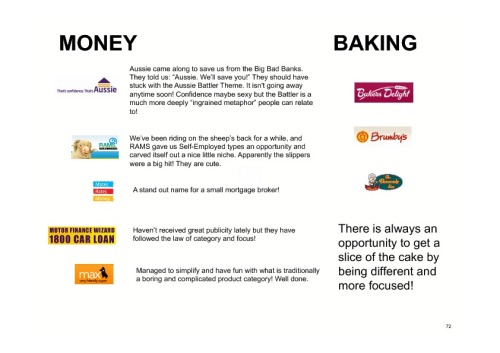
by admin | Feb 19, 2011 | Blog, Content, Design, Promotion, Strategy
A Brand Positioning Statement, also known as a slogan or a strap line, is the creative interpretation of the Brand Promise or USP which we discussed earlier.
Brand (Positioning Statements) should be able to hold their position in the long run and ideally achieve the following 4 criteria:
- Differentiate the business (Communicate the USP)
- Provide a Creative (Campaignable and Sustainable) platform
- Benefits should be ideally expressed explicitly to the customer
- Provide support to the brand name
Even when designing a brand from scratch it is difficult to satisfy all 4 criteria, so meeting 3 for a new brand or even 2 during a re-brand is often a great result.
You need to communicate with:
- Clarity
- Consistency
- Compression
to ‘cut through’ the clutter that is now prevalent in most service and product categories to consumers who are bombarded by more commercial messages than ever before!
So how do we do this?
Firstly we need to “own “own” a place in the consumer mind.
the easiest and most effective way of “owning a place in your customers’ and prospects’ minds is to focus on the things that matter. Most small and medium enterprises do not have the time or the money to be all things to all people, in fact neither do the very big companies, and when they try, they end up meaning nothing to anybody.
The result is at best mediocrity.
Focus demands Sacrifice – To own something you need to give up something else.
Focus on the particular type of buyer. Markets consist of buyers who differ in their:
- Wants
- Resources
- Locations
- Buying attitudes
- Buying behaviours
Simplicity adds value, by adding a halo effect for other benefits:
- Simple benefit (the most important promise) oriented word works best no matter how complex the product or market.
- The word must be exclusive.
- Avoid change, personalities don’t change, neither should your Brand.
- Positioning takes years and people don’t really change.
Next we will illustrate the power of brand positioning and focus with some examples.
How 2 Players Effectively communicated their Brand Positioning

Here are 2 industries and examples how the different players have through focus have found their niche and then effectively communicated their brand positioning.
Examples of the segmentation and brand positioning in the car…
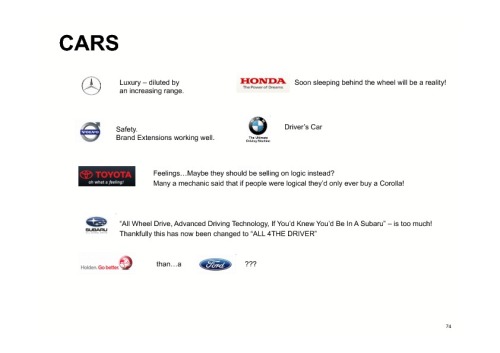
Examples of the segmentation and brand positioning in the car industry.
Positioning examples through segmentation in the car insurance…
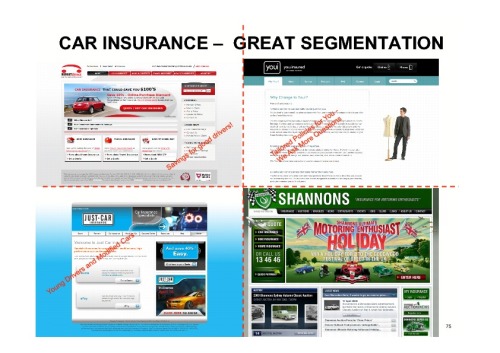
Positioning examples through segmentation in the car insurance category.
Most of the builders don’t have a positioning statement…
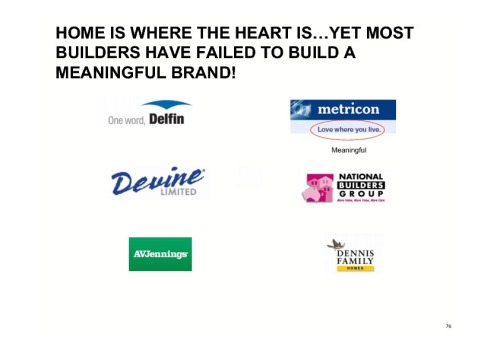
Most of the builders don’t have a positioning statement and are missing out on a great opportunity to truly connect with their prospects as well as be able to develop creative and more effective communication.
There is always an opportunity to be the “first”…
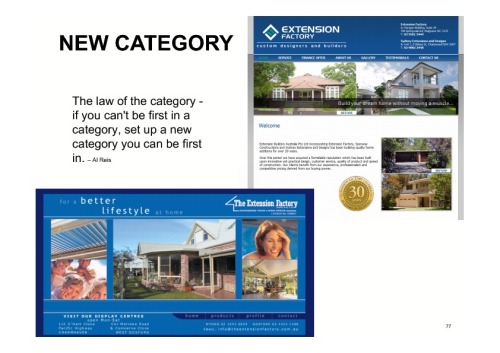
There is always an opportunity to be the “first” through even more focus. At the same time one has to be careful to protect their brand name!
…and then you can focus some more!
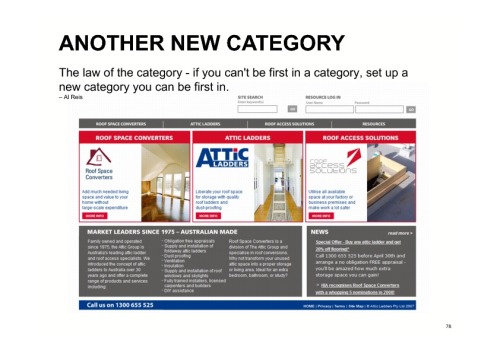
…and then you can focus some more!







Recent Comments